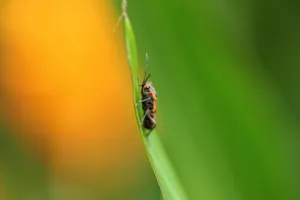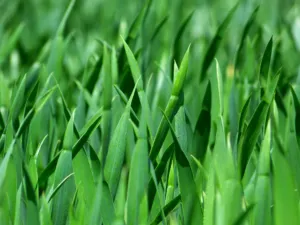
A picture-perfect lawn can seem absolutely fine on the surface. But trouble might be lurking beneath. Chinch bugs could be wreaking havoc without you even knowing.
These tiny invaders are one of the most destructive lawn pests in the southern U.S., especially in lawns with St. Augustine grass. Chinch bugs suck the life out of your grass, leaving behind ugly brown patches that spread rapidly.
If you’ve noticed strange yellow or brown spots in your lawn that don’t respond to watering, chinch bugs might be the culprit. Want to get to know this relentless lawn care pest? Keep reading to learn about:
Learn more about lawn pest control
Chinch bugs are itty-bitty insects, but they cause big problems. They’re often smaller than a grain of rice, so it can be hard to spot them if you aren’t looking closely.
These tiny lawn pests feed on grass by piercing the blades and sucking out the sap. While doing so, they inject toxic saliva that prevents the grass from absorbing water. It’s a double-whammy that instantly harms your lawn, causing it to rapidly decline in health.

Quick Facts About Southern Chinch Bugs:
These pests love hot, sunny, and dry conditions, so well-irrigated southern lawns are usually less inviting to them. However, they can still strike even the healthiest turf.
Chinch bug damage in Alabama, Arkansas, Florida, Oklahoma, Tennessee, Georgia, and South Carolina can look like drought stress or fungal disease. That’s why it’s important to know how to identify the signs of chinch bugs. Here are some tips, tricks, and what you should look for.
You may see your grass turn yellow, then brown, and eventually die. Damage from chinch bugs often starts near sidewalks, driveways, or sunny areas.
What happens to drought-stressed grass after watering? It perks up, looking happier and healthier. But grass that’s affected by chinch bugs? It looks the same since it can’t respond to the water.
This DIY test for chinch bugs is simple. Cut both ends off a coffee or soup can (the larger the can, the better). Press it a couple of inches into the soil at the edge of a damaged area. Then fill it with water and wait 10 minutes. If chinch bugs are there, they’ll float to the top of the water.
Do you catch a musty or foul smell when walking across your yard? Chinch bugs emit a distinct, unpleasant odor. This stink increases if they’ve been crushed underfoot.
Part the grass near damaged areas. Look for tiny, fast-moving bugs in the thatch. You may even need a magnifying glass since chinch bugs are so small.

Prevention is always a strong tactic in lawn care services and pest control. Here’s how to make your warm-season lawn less appealing to chinch bugs in particular:
Also, you should avoid these three common mistakes that many homeowners in the South make:
So, you’ve confirmed that chinch bugs are present in your yard. Now what? It’s important to act fast because chinch bugs multiply quickly.
Applying bifenthrin or cyfluthrin in the early morning (when pests are active) can help against chinch bugs. But be sure to always follow label instructions to avoid harming pollinators and beneficial insects.
The most effective option when dealing with chinch bugs? Contact your local lawn care service experts at Fairway Lawns. With highly trained technicians and industry-leading products, we’ll take steps to help achieve your dream yard. This includes:
Fairway Lawns proudly serves seven states and dozens of communities, ensuring high-quality lawn care and pest control services across the South:
Chinch bugs are small, but their damage can be huge. Early detection and prevention are key to keeping your lawn healthy all summer long.
If you suspect chinch bugs are destroying your grass, don’t wait. Get in touch with Fairway Lawns today! We’ll create a customized treatment plan to eliminate any lawn pests and give you a picture-perfect yard.